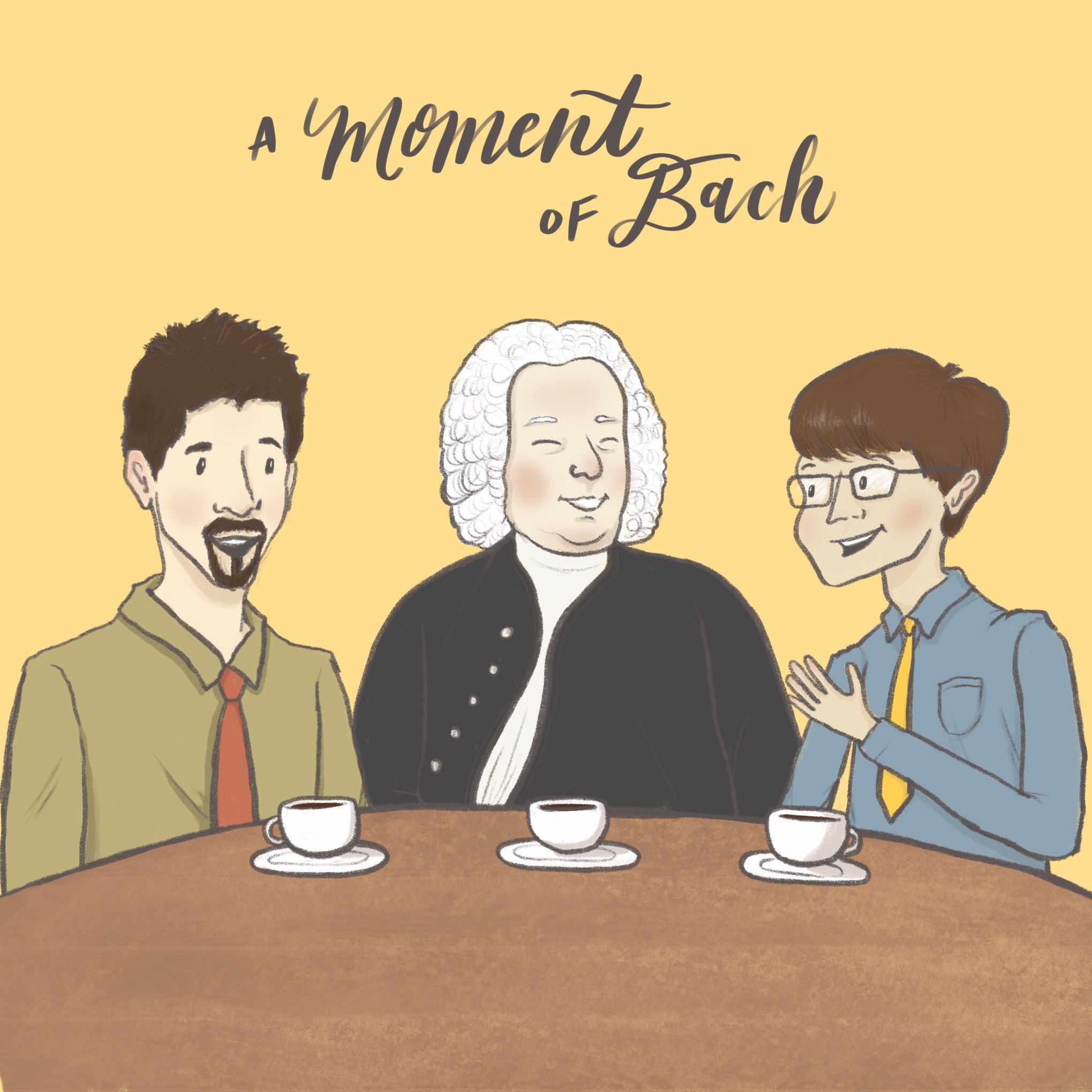
214.2K
Downloads
162
Episodes
Welcome to A Moment of Bach, where we take our favorite moments from J. S Bach's vast output—just a minute's worth or even a few seconds—and show you why we think they are remarkable. Join hosts Alex Guebert and Christian Guebert for weekly moments! Check wherever podcasts are available and subscribe for upcoming episodes. Our recording samples are provided by the Netherlands Bach Society. Their monumental All of Bach project (to perform and record all of the works of J. S. Bach) serves as source material for our episodes. https://www.bachvereniging.nl/en https://www.bachvereniging.nl/en/allofbach Artwork by Sydney LaCom
Episodes

46 minutes ago
Brandenburg Concerto No. 1: Menuet
46 minutes ago
46 minutes ago
The three instrument families in this big baroque orchestra leads us to speculate that Bach represented three social classes: the royal elite (elegant strings, one leader), the aristocratic nobles (horns, for upper-class hunting expeditions), and the common people (reeds, as for outdoor bands or shepherding). Bach concludes the concerto with the elegant and grand menuet (note his spelling; not "minuet"). The French dance exudes class and status, though in this case, the hunters and even the common townsfolk are invited to participate in the great dance of strings, reeds, and horns.
In this episode we discuss the repeating refrain section, called the "menuet" section. There are three other parts of the complete structure to be discussed in our next two episodes.
Audio note: at 20:55-21:15, we recommend stereo listening, so that you can hear the two pitches/beats separated to the left (bottom pitch; slower beating) and right (higher pitch by perfect fifth interval; faster beating). The respective ratio is 2:3. As it gets slower, listen for two clicks on the left for every three on the right.

Monday Jun 23, 2025
Brandenburg Concerto No. 1: movement 3
Monday Jun 23, 2025
Monday Jun 23, 2025
The "rule of three" is in full effect here, as Bach carries us along with this jaunty dance, rhythmic triplets and triple sets of musical sentences abounding with life and energy. This eloquent piece can be considered a precursor to the later "sonata form" of the Classical period, along with Bach's other Brandenburg concertos.
Performance of movement 3 of Brandenburg 1 by the Netherlands Bach Society

Monday Jun 16, 2025
Brandenburg Concerto No. 1: movement 2
Monday Jun 16, 2025
Monday Jun 16, 2025
A far far cry from the happy hunting horns of the first part, the second part of Brandenburg Concerto No. 1 is a bitter adagio. To modern ears, its aesthetic of dark gangster drama is less galant, and more "Godfather."
(Look at our past seasons to find episodes covering Brandenburg Concertos 3, 4, 5, and 6.)
Performance of Brandenburg 1 by the Netherlands Bach Society

Monday Jun 09, 2025
Brandenburg Concerto No. 1: movement 1
Monday Jun 09, 2025
Monday Jun 09, 2025
"Horns, horns, horns, in dark Mindolluin's sides they dimly echoed. Great horns of the north wildly blowing. Rohan had come at last." (J.R.R. Tolkien, The Return of the King)
It's time for our yearly miniseries celebrating the famous Brandenburg Concertos! This year: Brandenburg 1.
The horn call has an undeniable power. Here, Bach uses it to great effect at the opening two measures of this rousing piece. We explore the baroque horn and its idiosyncrasies.
(Look at our past seasons to find episodes covering Brandenburg Concertos 3, 4, 5, and 6.)
Performance of Brandenburg 1 by the Netherlands Bach Society

Monday Jun 02, 2025
Jesu, der du meine Seele (BWV 78): 1. Chorus
Monday Jun 02, 2025
Monday Jun 02, 2025
-The second part of our look into Cantata 78, where we look at the opening chorus.
For an overview of this cantata and a deeper look at the wonderful duet and the rest of the parts, see the episode previous.
For this lamentation hymn about Christ's anguish used as ransom for our salvation, Bach chose to accompany the tune with a "lament bass." To start, he sets up this sad descending bass line as a repeated pattern under a varying texture (passacaglia). The stress on beat 2 of 3 is a Sarabande metric figure, reminding us of his more famous passacaglia "Crucifixus" in the B Minor Mass.
When voices enter, the tortured chromaticism is imitated and they herald the coming of the soprano melody, which would have been recognized by the churchgoers on that Sunday in 1724. Variations in musical texture always match the line of text currently being sung. In the many variations, the lamenting line can be in any instrument or voice, and may also be inverted and ascend in a sort of wailing prayer.

Monday May 26, 2025
Jesu, der du meine Seele (BWV 78): 2. Duet and overview of mvts. 3-7
Monday May 26, 2025
Monday May 26, 2025
In this year's Leaving Certificate for students in Ireland, the music exam consists of examples from Tchaikovsky's Romeo and Juliet, Irish composer Gerald Berry's Piano Quartet, and Queen's Bohemian Rhapsody. Also in the exam is this chorale cantata composed in 1724 in Leipzig for a church service in which the biblical story of Jesus healing the lepers was read.
The hymn Bach based this work on was flexible enough for a dramatic span of affectations across the seven parts of the cantata. In this episode we will look at moments in the duet, and also speak to the other parts, through the final chorale.
The relative simplicity of the final chorale is defied by its several complexities. Its text is prayer-like, much like the other movements, with its first line reminiscent of the familiar saying "Lord, I believe; help me in my unbelief (weakness)." Even in relatively simple harmonization, the text is full of vivid emotion. Bach enjoys a chance for a militaristic trill near "Streit" (battle) and a Picardy third on the last note of hopefulness ("sweet eternity").
In the preceding recitatives and arias, the text painting is even more on-the-nose, as is the case with Bach. But while other cantatas have a single affectation, this one is always changing.

Monday May 19, 2025
Christ lag in Todes Banden (BWV 4): tenor solo aria
Monday May 19, 2025
Monday May 19, 2025
Welcome to A Moment of Bach, where we sometimes zoom in so close that our targeted moment consists of only one note! But Bach leaves us no choice but to pick this moment from BWV 4, where the music screeches to a halt, almost cartoonishly fast. One thing's for sure: when ever the word "nichts" comes up, Bach can't resist giving us some interesting text-painting.
Performance of BWV 4 by Netherlands Bach Society, conducted by Rene Jacobs

Monday May 12, 2025
Mass in B minor: Et incarnatus est
Monday May 12, 2025
Monday May 12, 2025
Here is, almost certainly, Bach's last composition for voices.
"Et incarnatus est" is the short choral movement in the Mass in B minor which precedes and sets up the central "Crucifixus." Being not quite yet Christ's death, the "Et incarnatus est" depicts the sighing descent of Christ being made man. A mournful coincidence: this music also imminently preceded Bach's death. He likely finished it in 1750, the year of his death, to complete the compilation of the masterfully crafted and structured Mass in B Minor.
Christian focuses on one of the single most haunting and uncommon chords: the augmented sixth chord, which in Baroque music is found only in the most sorrowful moments.
**Music theory note!** When we discuss the other augmented sixth chord example from "O Schmerz" in the St. Matthew Passion, this chord has that augmented sixth interval inverted, so while the effect is similar, this interval becomes a diminished 10th (from B in the bass to D flat in the tenor)!

Monday May 05, 2025
Badinerie from Orchestral Suite no. 2 in B minor (BWV 1067)
Monday May 05, 2025
Monday May 05, 2025
Today: we talk about Nokia ringtones, how Bach is the best at bass; Bach's French wordplay, and "Bach can be played at any tempo".

Monday Apr 28, 2025
Toccata in E minor BWV 914: fugue
Monday Apr 28, 2025
Monday Apr 28, 2025
This week's moment of Bach is a blissful ascending sequence in the fast final fugue movement of this keyboard toccata, which reminds us of the audacious repeating steps up and up (and down and down) of Monteverdi's "Si ch'io vorei morire."
Does this fugue opening sound familiar? Its subject is ALMOST another much more famous one. The fugue's ending is no less spectacular.
Fugue from Toccata in E minor BWV 917 as performed by Bart Jacobs for the Netherlands Bach Society
Si ch'io vorrei morire (Claudio Monteverdi): translation
